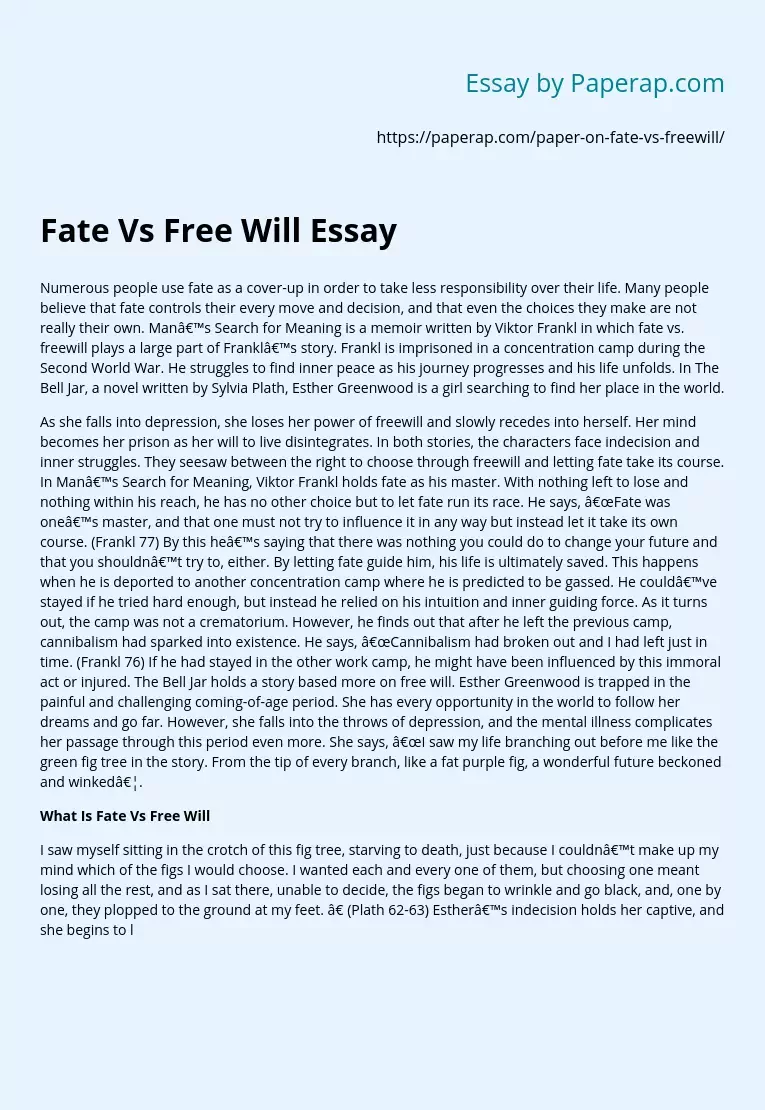Fate Vs Free Will Essay
Numerous people use fate as a cover-up in order to take less responsibility over their life. Many people believe that fate controls their every move and decision, and that even the choices they make are not really their own. Man’s Search for Meaning is a memoir written by Viktor Frankl in which fate vs. freewill plays a large part of Frankl’s story. Frankl is imprisoned in a concentration camp during the Second World War. He struggles to find inner peace as his journey progresses and his life unfolds.
In The Bell Jar, a novel written by Sylvia Plath, Esther Greenwood is a girl searching to find her place in the world.
As she falls into depression, she loses her power of freewill and slowly recedes into herself. Her mind becomes her prison as her will to live disintegrates. In both stories, the characters face indecision and inner struggles. They seesaw between the right to choose through freewill and letting fate take its course.
In Man’s Search for Meaning, Viktor Frankl holds fate as his master. With nothing left to lose and nothing within his reach, he has no other choice but to let fate run its race. He says, “Fate was one’s master, and that one must not try to influence it in any way but instead let it take its own course. (Frankl 77) By this he’s saying that there was nothing you could do to change your future and that you shouldn’t try to, either.
By letting fate guide him, his life is ultimately saved. This happens when he is deported to another concentration camp where he is predicted to be gassed. He could’ve stayed if he tried hard enough, but instead he relied on his intuition and inner guiding force. As it turns out, the camp was not a crematorium. However, he finds out that after he left the previous camp, cannibalism had sparked into existence. He says, “Cannibalism had broken out and I had left just in time. (Frankl 76) If he had stayed in the other work camp, he might have been influenced by this immoral act or injured. The Bell Jar holds a story based more on free will. Esther Greenwood is trapped in the painful and challenging coming-of-age period. She has every opportunity in the world to follow her dreams and go far. However, she falls into the throws of depression, and the mental illness complicates her passage through this period even more. She says, “I saw my life branching out before me like the green fig tree in the story. From the tip of every branch, like a fat purple fig, a wonderful future beckoned and winked….
What Is Fate Vs Free Will
I saw myself sitting in the crotch of this fig tree, starving to death, just because I couldn’t make up my mind which of the figs I would choose. I wanted each and every one of them, but choosing one meant losing all the rest, and as I sat there, unable to decide, the figs began to wrinkle and go black, and, one by one, they plopped to the ground at my feet. ” (Plath 62-63) Esther’s indecision holds her captive, and she begins to lose the desire to choose altogether. Her depression begins to blanket her completely, until neither fate nor freewill can save her. Indecision acts like a vice holding one’s head in a constricting grip.
The inability to choose where to go next can be painful and is often confusing. In Man’s Search for Meaning, Viktor Frankl is not a slave to vacillation. In trudging through life, he acts on his first instinct, his inner guiding force: fate. However, at times, a life changing decision is not made easily. When deciding whether or not to try and attempt an escape from the concentration camp, Frankl is thrown into a battle of fate vs. freewill. He does not know what will happen if he stays in the camp and let’s fate take its course; but if he runs away, he knows he can hope for freedom.
In a desperate act of freewill, he decides on the latter. He doesn’t get very far in his attempt, but his actions show his confusion within the battle of fate vs. freewill. Esther Greenwood in The Bell Jar also shows a deep misunderstanding of her life. She wishes for all that she cannot have, and it drives her mad. She says, “If neurotic is wanting two mutually exclusive things at one and the same time, then I’m neurotic as hell. I’ll be flying back and forth between one mutually exclusive thing and another for the rest of my days. (Plath 76) In this quote she’s saying that it is impossible for her to set her mind on just one thing. This shows how her actions are guided by freewill and not fate, as she cannot follow any instincts or premonitions. There are those who say that one creates his fate, and others who say that it is fate that creates us. As for the truth; it lies buried in the struggles of the mind, in indecision, and in the ability to firmly say yes or no. Both Man’s Search for Meaning and The Bell Jar show the struggle of the will of man against instinct and a higher guiding power.
It is generally the first instinct that guides people onward in their lives. But how many times does one regret making a decision they should not have? How many times does one regret not making a decision they should have? If instinct ties directly to fate, then it is safe to say that fate is not an indestructible guiding force. Relying solely on fate alone will bind the mind, and limit the spirit. A person will make mistakes no matter what they believe, and it is important to understand the value of choice and consequence.
Fate Vs Free Will Essay. (2019, Dec 05). Retrieved from https://paperap.com/paper-on-fate-vs-freewill/

